|
August 25, 2005
Presenting: Mary Jane Mikuriya - Servas
Traveller and Committed Local Volunteer in San Francisco
When I first met Mary
Jane at the recent Canadian-US
Servas Conference in Vancouver, her youthful radiance struck
me. I thought she might be in her early fifties, and then she revealed
that she is 70! No wonder - here is a woman who exudes optimism,
who always has a smile on her face. As a long-term member of Servas
in the United States, Mary Jane has travelled the world, and
by being a host she has brought the world into her home - in fact
in almost 30 years she has opened her home to around 300 travellers
from all over the world.
Starting with her childhood during WWII, growing up with a mother
from Austria-Hungary and a father from Japan, Mary Jane's intercultural
sensitivities got sharpened very early, and her commitment to social
justice started when she was very young. Today she is involved in
a whole range of causes in San Francisco and her time and dedication
are making a difference - Mary Jane builds peace one person at a
time. Here is a dynamic woman with a truly interesting story:
1. Please tell us a little bit about yourself. Where are
you from, what is your profession, where do you live now?
I was born and raised in Pennsylvania. My parents were college educated
but were looked down upon by the locals as foreigners. My father
was prevented from becoming a citizen due to the federal 1924 Asian
Exclusion Act until the early 1950 when the law was changed.
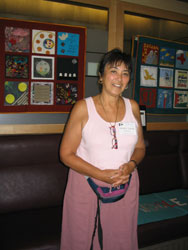
Mary Jane
My mother lost her citizenship because in the 1920s when my parents
were married, a woman who married a foreign man would loose her
citizenship, no matter if she was a birth right citizen or a naturalized
one. This was not the case for men. Thus, my mother was naturalized
twice. This law was eventually changed in the 1930s. Citizenship
and human rights became an important issues in my life.
As a first generation American, with a mother from Austria-Hungary
and a father from Japan, you can imagine the stares we received
as a mixed race family with a 5' 10" Caucasian mother and a
5' 6" Asian dad. You can't imagine how we were treated growing
up during W.W.II with a German speaking mother and a Japanese speaking
father.
As a child, I was familiar with discrimination in society. When
a very blue black Kenyan and a Japanese American from the Relocation
Camps could not find a place to rent in the Philadelphia-Trenton
area, they came to live with us. And there were others that stayed
with us over the years, but that was before the 1964 Civil Right
Act disallowed discrimination.
Although I wanted to be an engineer like my dad, I realized after
my second year in college that this would not be possible. In the
1950 women were not considered for engineering jobs. So when the
Russians launched Sputnik, the United States launched a recruitment
drive for math and science majors to become teachers.
That is how I was recruited into the education profession where
I have worked for over 35 years. I had many roles related to education
in public and private schools, at the university level and with
the US Department of Education -- teaching, educational program
evaluation, gender equity/civil rights/ de-segregation-integration,
grant writing, budgeting and administration. Today, I am retired,
but still work part time as a Title I math tutor to enable low achieving
children to become successful in their regular classrooms.
I live in San Francisco which has a rich history of civil right
activism and provides many opportunities to support peace and social
justice issues. My life is enriched by my many volunteer activities.
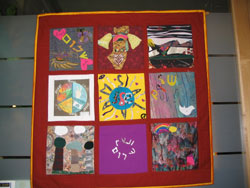
Israeli-Palestinian peace quilt
2 You have been a Servas member for many years now. How
did you hear about this organization and what was your first travel
experience like?
As a teacher you have a large block of time to travel in the summer.
One summer, I visited Denmark and had the opportunity to have home
hospitality though the Meet the Danes arranged by the Danish tourist
bureau. I was impressed by the experience and all during my sabbatical
trip round the world, I kept searching for home hospitality opportunities.
It was not until 1977, when a cousin from Austria visited me here
in San Francisco, told me how she was traveling around the US for
3 months with 5 others and visiting Americans using Servas.
I was delighted to discover such an organization existed and joined
Servas immediately -- first as a host and then as a traveler.
My first travel experience with Servas was as a host. Because I
have a history of having people stay in my home, having Servas visitors
came easy. It is only a two night stay and a good conversation.
Being a host brings the travel experience into your home. My first
visitors were a couple from Denmark, who helped me better understand
what Servas represents. Because Servas was started in Denmark under
the name Peace Builders and later changed to the Esperanto word
Servas to serve, I realized that the purpose of the organization
was to build peace one person at a time. That was for me!
I have had over 300 Servas visitors in my 28 years in Servas and
have learned so much from their questions about who I am, what I
believe, what the USA is or is not, and how much more there is to
learn. There are many ways to travel and see other places. One of
the best ways to travel is through the open wide ranging conversations
with a travelers whether it be in their home or mine.
3. Please tell us a few stories about some of the international
visitors that have stayed at your home or travellers you connected
with, and tell us how some of these experiences have opened your
eyes..
The Russian Connection:
One of my visitors was a teacher in Russia and wanted to see inside
a San Francisco public school. I arranged for him to visit a second
grade class. The students enthusiastically welcomed him. He pulled
up a bill out of his wallet and showed it to the class. He asked
the class who the man was. Many hands went up and he discovered
that they all thought the person to be Abraham Lincoln, because
he was on money and had a beard. But, no it was Lenin who was also
famous but in Russia. And where is Russia? Here on the map was Russia
and here is San Francisco. I came away with a conscious awaking
about my cultural lens. As I look at different situations as I travel,
I may not perceive them correctly. I need to reflect, discuss what
I think I perceive and ask for clarification.
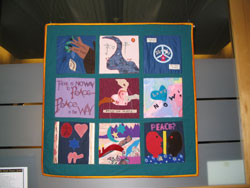
Israeli-Palestinian peace quilt
Discovering antique quilts at Esprit, of all places:
A Servas visitor from Australia, was an artist who wanted to see
the wall hangings at Esprit, a women's clothes designer and distributor.
I said I did not think they had quilts but would call to see if
we could visit them. Much to my surprise, the company headquarters
was filled with antique quilts, the company provided a catalogue
of their quilts which could be purchased and there were open visiting
hours. No, there was no publicity about this display and the company
preferred word of mouth. When we visited, I did not know as we walked
through the large brick walled building whether to look at the fabulous
quilts or at how the company headquarters was organized. I realized
that these quilts were made by women and were such designs as white
on white squares that would be seen at the Museum of Modern Art
a hundred or so years later. I realized that my visitor had shown
me part of San Francisco that I was completely unaware of, but thanks
to her I learned about them. When the company was sold, the quilts
were donated to a museum for all to see.
Learning about Tajikistan:
One of my most recent Servas visitors was from Tajikistan. I must
say I did not know anything about this country or even where the
country was on the map. So I went to the World Fact Book developed
by the CIA. Yes, the CIA which offers very current country specific
information freely on line. I learned that it was in Central Asia
and formerly part of the Soviet Union. When the Soviet Union left,
there was no structure of government. Tajikistan was destabilized
by civil war which has resulted in tremendous personal losses, economic
crisis, deep poverty and other social problems. Tajikistan had the
lowest per capita GDP of all the 15 former Soviet Republics. Muborak,
my guest said that many have left Tajikistan for safety and economic
reasons and they send money home. For those that remain, the economy
is very poor--the teachers receive $2 per month, the physicians
$5 per month and the public servants do not always receive their
government pay checks. Under these conditions, bad things are happening.
Muborak is a sociologist who was here in the US to give her third
presentation to the UN on the (mis)treatment of women and children
in Central Asia. She and her team of women investigators have interviewed
over 1000 abused women and 5000 abused children. There is no government
agency to support women's rights and children's rights in these
countries, hence Muborak is bringing this information to the UN
to encourage UN action to support the UN Millennium Goals for women
and children.
Insights about Zimbabwe:
In Spain, I met a Servas host from Zimbabwe. She has always lived
in that county, which used to be call Rhodesia. She is 78 years
old and her retirement pay has not kept pace with inflation. She
said her retirement pay is equivalent to 2 slices of bread. I asked
how she survived. She says that she has joined some other retirees
and they share their skills and creativity. She is responsible for
fruit and vegetable dumpster diving and brings home the discards
from the fruit and vegetable market. They can always make soup for
their group and survive.
From Servas members, I learn of events that are not published or
talked about in the media. I value how Servas has provided me the
opportunity to learn what is happening in other parts of the world
that are not available in the press or on TV.
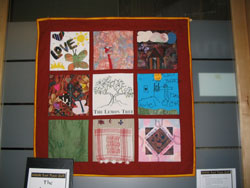
Israeli-Palestinian peace quilt
German-Jewish encounters to make peace with the past:
During Servas Gatherings, Travelers report where they have been
and what they have learned. Over the last 5 years, several older
Jewish US travelers originally from Europe decided to face their
concerns with Germany. They reported having wonderful German Servas
hosts and realized their hosts were not alive during the Nazi Era.
When they returned to the US, they surprised themselves with the
realization they had made their peace with their anxiety surrounding
Germany. What a relief! What a gift! They had made their peace with
Germany. Can you hear their surprise and thanks to Servas? What
a wonderfully powerful possible solution to reducing long held negative
beliefs and fears -- to visit the hosts in country of concern to
see if your concerns are still valid.
4. Please tell us about your 3 favourite or most memorable
travel stories.
My father died in 1986. I felt as a US Servas Board member that
I had to attend the Board meeting in Seattle. I decided to drive
and take two weeks enroute and one week after the Board Meeting.
I took my two interracial children, then 5 and 6 years old, and
our Chinese American teenage baby sitter who had never been out
of San Francisco.
One of our visits was in Bellingham, WA. There we stayed with a
single 80 year old Servas host who welcomed all 4 of us Servas Travelers.
She was an amazing woman who when she got a divorce had gone into
the Peace Corps for 2 years, upon returning to Bellingham met her
next husband. When he died she joined the Peace Corps again. Now
at 80 her last husband had died so she joined Servas because she
missed the conversation with internationally minded travelers. During
our first day, there she took us to the Methodist Church's children's
beach picnic. This is the first time that these elementary school
children from Bellingham had met mixed race children. The blond
children would touch my African American daughter's dark skin and
very curly hair. The mothers were welcoming but curious about our
host and how she had such unusual guests. It was an experience for
me since I had not realized there were such racially isolated communities
in my own country. My host was pleased to share her guests, the
type of people she had worked with in the Peace Corps, and and we
were pleased to see that we could be part of her community education
project.
When I returned to San Francisco, I felt that my grieving over my
father's death had changed to acceptance. It was if a long time
had passed. I now understand the power of travel for healing the
psyche and for helping in important transitions in life.
5. You are also an interviewer for Servas and that has
given you some unique insights. Please comment.
I am an interviewer for Servas Travelers. We have certain requirements
and expectations for Travelers.( See www.usservas.org
for the forms and directions.) One of the requirements is to complete
a Letter of Introduction which asks 5 questions. Before and during
the interview there are two questions that separate appropriate
travelers from the freeloaders. One of the questions has to do with
what the potential traveler does to promote Peace and the other
asks about the purpose of your trip.
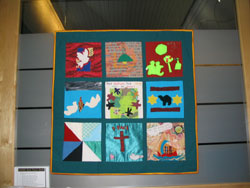
Israeli-Palestinian peace quilt
I am amazed the number of travelers that feel that they are not
involved in Peace activities because they think that peace activities
are organized activities. Perhaps another way to ask this question
is what volunteer work do you do. Then the applicant can tell you
how they volunteer in a center for handicapped, tutor adults in
reading, or staff a hot line crisis center. One Servas traveler
who worked with homeless youth in San Francisco was taking a Servas
trip to the Vatican before he went into a monastery. During the
trip, he stayed with a Servas host who took him sailing on the Adriatic
and as a result of this visit, the traveler decided not to join
the monastery but remain helping homeless youth as a form of service
to God. He wrote in his travel report how Servas Changed his life.
What I see that Servas travel is a good help for people making a
career change. When the dot-com bust occurred in San Francisco,
the unemployed dot-com workers who had put in 16 hour days decided
they needed a different kind of life and used Servas to visit hosts
who were in their field of interest, say Environmental or women's
rights. For me interviewing for Servas has opened my eyes to many
wonderful, concerned, dependable, interesting people who want to
make a better world.
As a Servas traveler I am impressed with the hosts dedication to
helping others. In Germany, I stayed with a host who spoke Russian
and Slavic languages. Under the European Union, the undocumented
non EU immigrants were jailed. She would go to the jail and translate
for the prisoners. In Thailand, my host Jurunee asked where I would
like to visit. I said the We-Train Women's Project which provides
vocational training for women, emergency housing for women and their
children, a clinic for women with AIDS and care for orphan babies.
My host and her 4 year old daughter took me there and we toured
the facility together. As a result of the visit she said that she
would donate her daughter's out grown clothes and collect children
clothes from her friends for this Women's project.
6. You also dedicate your time to promoting social justice
and peace. What kind of initiatives are you or have you been involved
in?
Justice is very important to me. Know what injustice is and how
it can hurt, it is important to speak up and be counted.
San Francisco is a very expensive city and some working poor have
to choose between food and housing. Each winter, the Unitarian Church
hosts 90 working poor men for 6 weeks. The mayor's office provides
the beds, the food bank supplies the food and the Unitarians provide
the housing and cook the breakfasts and dinners and clean up after.
I find that I like to work the early shift from 5:30 AM - 7:30AM
to cook breakfast. It is a humbling feeling to know that minimum
wage and living wage are not the same. It is for that reason that
I support the Living Wage Coalition through petition drives, advocacy
and money. There are many causes that need our support and I feel
that volunteering is a wonderful way to be connected to our fellow
men.
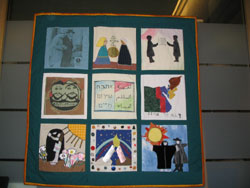
A Vietnamese young man joined a Vietnamese gang. He was a college-bound
student, who earned a bit of money working for me. One day he called
to say he would not come to work, he was in jail. What was he doing
in Jail? He and his gang got into a fight. He was not supposed to
be in jail more than 24 hours as a juvenile, so I called the Asian
Law Caucus for help. They arranged to have his release. Within two
years, Coung's best friend was killed in gang activity. Yet, Coung
could not quit the gang. I helped him distance himself from the
gang by counseling him how to graduate in January instead of June,
taking night work at a hotel, and leaving the area. Coung is now
working on his CPA, has a good job and has made a success of himself,
sadly, he can never return to San Francisco. He calls me on Mother's
Day for a chat. Why? Because I was his mentor and helped him change
his life. We all need mentors in our life to become the best we
can be. Just think about the people who were important in your life.
When is the last time you talked to them and told them how they
had helped you?
7. When you are not volunteering for a good cause, how do
you spend the rest of your time?
Actually I spend about 30 volunteer hours a week on Servas Administration,
as the Vice Chair and International Representative of US Servas,
Chair of several committees, interviewing new members and in the
leadership of local Servas Activities. However, due to term limits,
I will be off the board and have more time for a personal life.
I work about 70 days a year tutoring and organizing parent meetings.
Good thing I find work rewarding.
When I am not working for Servas or in schools, I am baby-sitting
my grand son or organizing family events. I enjoy preparing dinners
and hosting US State Department visitors for the International Diplomacy
Council. I like to listening to books on tapes while cooking for
a crowd. I look forward to socializing more and attending the theater
next year when I will not be on the Servas board
8. What are your upcoming plans, travel and otherwise?
I love to travel. In the near future, I look forward to traveling
to Brazil, visiting Cappadocia in Turkey and arranging home exchanges
in Florence, Barcelona, and Vancouver. Who knows I may sign up to
teach English in another country.
9. You are amazingly youthful for your age. Please share
with us the secrets of how you stay so young. (I just have to ask....;)
I feel youth is a state of mind. I feel young perhaps because I
know so many good people. I believe that the Laws governing human
happiness and fulfillment are:
Give to live; Share to enjoy ;Serve in order to unfold.
It's been great, Mary Jane, to hear your life's story up to now,
a true example of someone who has triumphed in difficult circumstances
and chosen to share her home, her energy and her time to make this
a better world. I hope I have a chance to visit you some day in
San Francisco and see you in action.........
Related Articles:
Presenting: Pablo Chufeni
- Servas member, champion of youth causes for Servas
Presenting: Robert & Bette Allekotte
- Servas members & family travellers
Presenting: Helga Smith - Servas
traveller, Marathon runner, conqueror of Mt. Kilimanjaro
Preview: Robert
& Bette Allekotte - Servas members & family travellers
Preview: Gilbert Sherr
- Servas traveller & cultural researcher
Preview: Mary Jane Mikuriya
-Servas traveller, volunteer for peace and social justice
Preview: Helga Smith
- Servas member, Marathon runner, conqueror of Mt. Kilimanjaro
Preview: Pablo Chufeni
- Servas member, Champion of youth causes in Argentina
Coverage of the first Canada-US
Servas Conference in Vancouver, Aug 3 to 5, 2005
Interview with Patrice Samara from the
US Office of Servas
An interview with another global volunteer organization: Doctors
without Borders
The story of Toronto woman Danielle Lafond who mortgaged her home
to start a community
development organization in Peru
The story of Mony Dojej and her 5000
km Walk for Peace from Rome to Jerusalem
My reflections on the day of the London
Transit Bombings
Here you can read my other travel stories from this
trip to Victoria and Vancouver
|